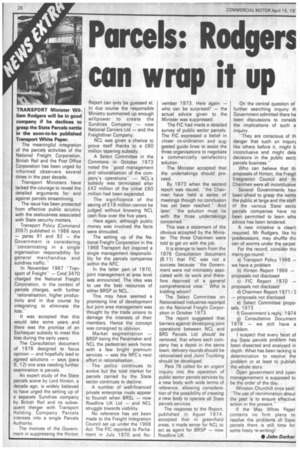Parcels: Rodgers can wrap it up
Page 28

If you've noticed an error in this article please click here to report it so we can fix it.
Report can only be guessed at. In due course the responsible Ministry summoned up enough willpower to create the Sundries Company — now National Carriers Ltd — and the Freightliner Company.
NCL was given a chance to prove itself thanks to a £60 million tapering subsidy.
A Select Committee in the Commons in October 1973
noted the -good management and rationalisation of the company's operations— NCL's
subsidy was terminated after £42 million of the initial £60 million had been expended.
The significance of the saving of £18 million cannot be judged without knowing NCL cash flow over the five years.
Here again, although public money was involved the facts were shrouded.
The setting up of the National Freight Corporation in the 1968 Transport Act inspired a single management responsibility for the parcels companies within the NEC.
In the latter part of 1970, joint management at area level was announced. The idea was to use the best resources of either BRSP or NCL.
This may have seemed a promising line of development but joint area management was thought by the trade unions to damage the interests of their members. Hence the concept was consigned to oblivion.
Market segmentation — BRSP being the Pacemaker and NCL the pedestrian work horse with a few bright premium services — was the NFC"s next effort in rationalisation.
The policy continues to evolve but the total market for parcels carried by the State sector continues to decline.
A number of well-financed private enterprise rivals appear to flourish when BRSL — now Roadline UK Ltd — and NCL struggle towards viability.
No reference has yet been made to the Freight Integration Council set up under the 1968 Act. The FIC reported to Parliament in July 1970 and No vember 1973. Here again — who can be surprised? — the actual advice given to the Minister was suppressed.
The FIC had made a detailed survey of public sector parcels.
The FIC expressed a belief in closer co-ordination and sug gested guide lines to assist the three organisations to negotiate a commercially satisfactory solution.
The Minister accepted that the undertakings should proceed.
By 1973 when the second report was issued, -the Chair
men have held a series of meetings though no conclusion has yet been reached." And
later: "the solution must lie with the three undertakings concerned.
This was a statement of the obvious accepted by the Minister. The three Chairmen were told to get on with the job.
It is strange to learn from the 1976 Consultation document (8.11) that FIC was not a success because "the Govern ment were not intimately associated with its work and there
fore deprived of a general comprehensive view.Who is kidding whom?
The Select Committee on Nationalised Industries reported on the National Freight Corporation in October 1973.
The report suggested that barriers against developing joint operations between NCL and BRS Parcels Ltd should be removed, that where each com pany has a depot in the same town, delivery rounds should be rationalised and Joint Trunking should be developed.
Para 76 called for an urgent inquiry into the operation of public sector parcels services by a new body with wide terms of reference, allowing consideration of the possibility of creating a new body to operate all State parcels services.
The response to the Report, published in Agust 1974, accepted that in greenfield areas, it made sense for NCL to act as agent for BRSP — now Roadline UK. On the central question of further searching inquiry th Government admitted there ha been discussions to considf the implications of such a inquiry.
"They are conscious of th danger that such an inquiry like others before it, might b inconclusive and might dela decisions in the public secto parcels business.'"
Who can believe that th, proposals of Hinton, the Freigh Integration Council and thi Chairmen were all inconclusive
Several Governments hay, been afraid to grasp the nettle the public at large and the staff of the various State secto parcels companies have no been permitted to learn wha advice has been tendered.
A new initiative is clearl) required. Mr Rodgers, like hh 'predecessors, may shuffle thi! can of worms under the carpet. For the record, consider thi.5 merry-go-round: a) Transport Policy 1966 — we have a problem b) Hinton Report 1966 — proposals not disclosed c) FIC Report 1970 — proposals not disclosed d) Chairmen Report 1971/2 — proposals not disclosed e) Select Committee proposals, 1973 f) Government's reply, 19-74 g) Consultative Document 1976 — we still have a problem.
I suspect that every facet of the State parcels problem has been dissected and analysed in depth. What has been lacking is determination to resolve the problem or at least to publish the whole story.
Open government and open managemement is supposed to be the order of the day.
Winston Churchill once said: "The use of recrimination about the past is to ensure effective action in the present.
If the May White Paper contains no firm plans to resolve the problems of State parcels there is still time for some hasty re--writing!
• John Darker




























































































